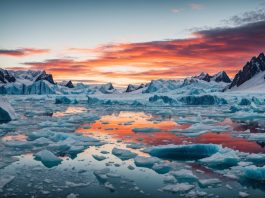A study led by researchers from the Barcelona Institute for Global Health (ISGlobal) has used a novel approach to unravel the influence of Arctic sea ice loss on the planet’s climate, isolating it from other factors related to climate change.
The study shows that on decadal timescales, the loss of Arctic ice favours the climate of the southwest of the United States, with California, in particular, becoming drier on average in winter.
This phenomenon would also affect the climate of Spain and Portugal, favouring conditions of higher humidity in winter, although in this case, the observed effect is weaker.
Ivana Cvijanovic, ISGlobal researcher and lead author of the study, explained: “There is much scientific disagreement about the remote effects of Arctic sea ice loss. So far, many studies have focused on the long-term effects on a scale of centuries.
“Others have investigated the response to sea ice loss with modelling setups that artificially impose heat to melt the sea ice, potentially affecting the simulated response.”
Isolating the effects of Arctic sea ice loss
Some studies have been changing Antarctic and Arctic sea ice cover at the same time, making it difficult to discern their individual contributions.
However, this study has developed a methodology to assess the impact of Arctic ice loss without adding any heat fluxes, focusing on the impacts developing within a few decades.
To reach these conclusions, the team used three models of varying complexity. In each of them, they ran two sets of simulations, one with the historical amount of sea ice in the Arctic and one with substantially decreased sea ice cover.
The disappearance of sea ice changes the surface albedo, i.e. the reflectivity of the Arctic Ocean, but also removes the insulation between the atmosphere and the ocean surface and affects salinity profiles.
These local changes, in turn, drive a variety of atmospheric and oceanic teleconnections that can propagate far from the Arctic.
Impact on climate in the southwest US and the western Mediterranean
Desislava Petrova, ISGlobal researcher and last author of the study, commented: “It should be made clear that the conclusion is not necessarily that it will rain less in California and more in the Western Mediterranean in the coming years.
“In addition to the ice cover loss in the Arctic, many other factors are responding to greenhouse gas emissions and affecting the climate (atmospheric and oceanic feedback and circulation changes, Antarctic sea ice loss, vegetation feedback).
“In any case, understanding the influence of this phenomenon separately will help us to refine global predictions.”
Insights into the long-term impact of Arctic sea ice loss
Despite all the different influences in our planet’s climate system, it is interesting to note that the anomalies in the atmospheric circulation patterns of the last few decades show some striking similarities to the patterns simulated in the study.
In particular, events such as the Californian drought of 2012-2016 seem to line up with the findings of the study.
Overall, this shows that the impact of Arctic sea ice loss is profound across the globe, contributing to extreme weather events and requiring further investigation.









